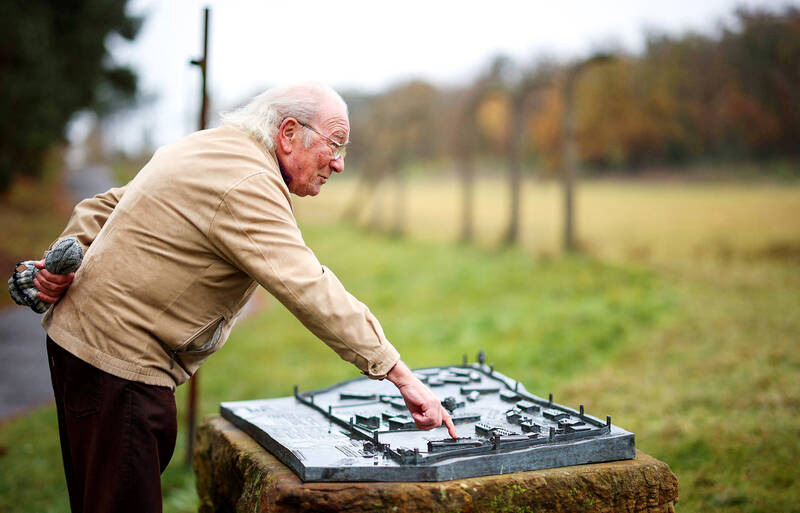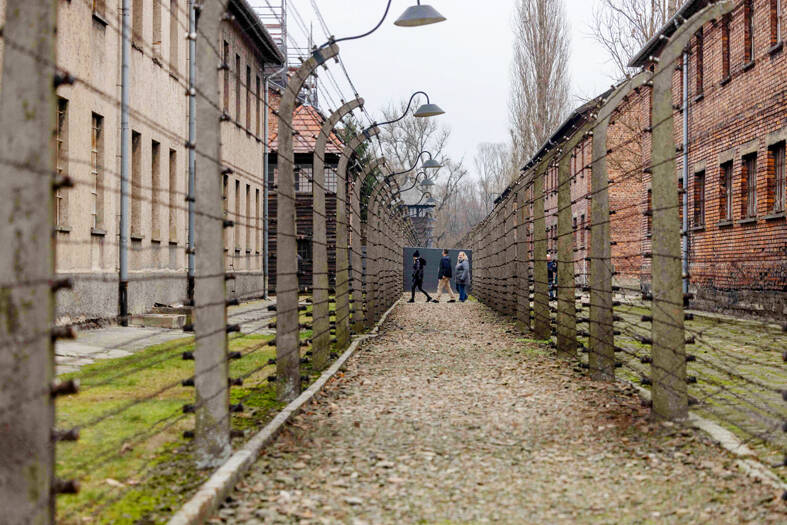For 80 years, details of their ancestors’ collaboration with the Nazis have been buried in spotless rows of filing cabinets in The Hague. But thousands of Dutch families face having their relatives’ history laid bare when an archive opens on 425,000 people accused of siding with the occupier during the World War II.
The central archives of the special jurisdiction courts (CABR), established after the allies liberated the Netherlands to bring collaborators to justice, will open today under national archive rules.
Until now, the most visited war archive in the Netherlands has been accessible only to researchers, those involved and direct descendants. But from today the physical archive will open to general visitors.

Photo: AFP
For the first three months of this year, researchers and descendants of victims and alleged perpetrators will also have digital access to a quarter of this extraordinary database — on site at the national archive in The Hague — for the first time.
Relatives have mixed feelings about the move.
“It’s a bit uncomfortable,” said Connie, 74, one of three sisters whose family history is contained in the archive. “I don’t know what could come out of it eventually, if people Google our surname.”

Photo: AFP
But some in the Netherlands believe that openness about the country’s wartime past, including its economic and bureaucratic collaboration, is crucial. Three-quarters of the Dutch Jewish population — more than 102,000 people — were murdered by the Nazis, with antisemitic collaboration from the state, police and some of the Dutch population.
It is a past that the country is only now coming to terms with, opening a national Holocaust museum, making a public apology and funding research into the role of institutions and transport firms.
“This is part of the repression by the Dutch of their memories of collaboration, after we had punished our military and political collaborators,” said Johannes Houwink ten Cate, an emeritus professor of Holocaust studies at Amsterdam University. “I can understand the children and grandchildren of collaborators now fear possible consequences, but my personal experience is that their feelings come to rest once they have seen the files. Making this open is an important step.”

Photo: AFP
Initially, the intention had been to put the archive online at the Web site Oorlog voor de Rechter (“war before the judges”). But the prospect sparked public disquiet and the Dutch Data Protection Authority (AP) issued a warning that putting the archive of suspected collaborators online would breach privacy laws.
“In the spring of 2024, the AP had a signal from a surviving relative that the planned publication of the CABR was possibly not being organized in a lawful way,” it announced. “The national archives must now start working on an alternative method.”
Online publication is delayed and the culture minister, Eppo Bruins, says the archive should not be indexable by search engines such as Google. But eventually it is hoped that 30 million pages of witness reports, diaries, membership cards for the Dutch fascist party, medical records, court judgments, pardon pleas and pictures will all be searchable.
At a recent event at the NIOD Institute for War, Holocaust and Genocide Studies in Amsterdam, the director, Martijn Eickhoff, said the special court archive from 1944 and 1952 was a valuable historical resource. But it was also a period of wild accusation, he said: fewer than 15 percent of suspects were punished by tribunals and extraordinary courts, and two-thirds not at all.
“It is important to look at this archive carefully,” he said. “If a text is misleading, people become critical about the source, and this is what you learn to do as a historian … But because it contains so many personal documents, this affects people enormously.”
He compared the Dutch archive with modern-day Syria, where global experts are working to preserve evidence of crimes under the toppled dictator Bashar al-Assad.
“We hope to lead this experiment [opening the archive] on the right tracks. Not to open the door again to collective hatred,” he told a room of descendants, including Connie and her sisters Jolanda and Mieke.
The sisters, who asked for their surname not to be published, have different feelings about the opening of the archive. While Connie is concerned, Jolanda, 70, said she did not mind and Mieke, 68, said she was keen to see her grandfather’s dossier. He had a building company that carried out work for the Nazis, and in the reckoning after the war he was punished for it. The sisters’ father worked there too.
“But he was 18,” said Jolanda. “I don’t know what other things my grandfather believed, but Dad believed in a better world, not in Nazi ideology … But you can make choices, like my father’s family. Sometimes it’s a bad choice.”

June 2 to June 8 Taiwan’s woodcutters believe that if they see even one speck of red in their cooked rice, no matter how small, an accident is going to happen. Peng Chin-tian (彭錦田) swears that this has proven to be true at every stop during his decades-long career in the logging industry. Along with mining, timber harvesting was once considered the most dangerous profession in Taiwan. Not only were mishaps common during all stages of processing, it was difficult to transport the injured to get medical treatment. Many died during the arduous journey. Peng recounts some of his accidents in

“Why does Taiwan identity decline?”a group of researchers lead by University of Nevada political scientist Austin Wang (王宏恩) asked in a recent paper. After all, it is not difficult to explain the rise in Taiwanese identity after the early 1990s. But no model predicted its decline during the 2016-2018 period, they say. After testing various alternative explanations, Wang et al argue that the fall-off in Taiwanese identity during that period is related to voter hedging based on the performance of the Democratic Progressive Party (DPP). Since the DPP is perceived as the guardian of Taiwan identity, when it performs well,

The Taiwan People’s Party (TPP) on May 18 held a rally in Taichung to mark the anniversary of President William Lai’s (賴清德) inauguration on May 20. The title of the rally could be loosely translated to “May 18 recall fraudulent goods” (518退貨ㄌㄨㄚˋ!). Unlike in English, where the terms are the same, “recall” (退貨) in this context refers to product recalls due to damaged, defective or fraudulent merchandise, not the political recalls (罷免) currently dominating the headlines. I attended the rally to determine if the impression was correct that the TPP under party Chairman Huang Kuo-Chang (黃國昌) had little of a

A short walk beneath the dense Amazon canopy, the forest abruptly opens up. Fallen logs are rotting, the trees grow sparser and the temperature rises in places sunlight hits the ground. This is what 24 years of severe drought looks like in the world’s largest rainforest. But this patch of degraded forest, about the size of a soccer field, is a scientific experiment. Launched in 2000 by Brazilian and British scientists, Esecaflor — short for “Forest Drought Study Project” in Portuguese — set out to simulate a future in which the changing climate could deplete the Amazon of rainfall. It is